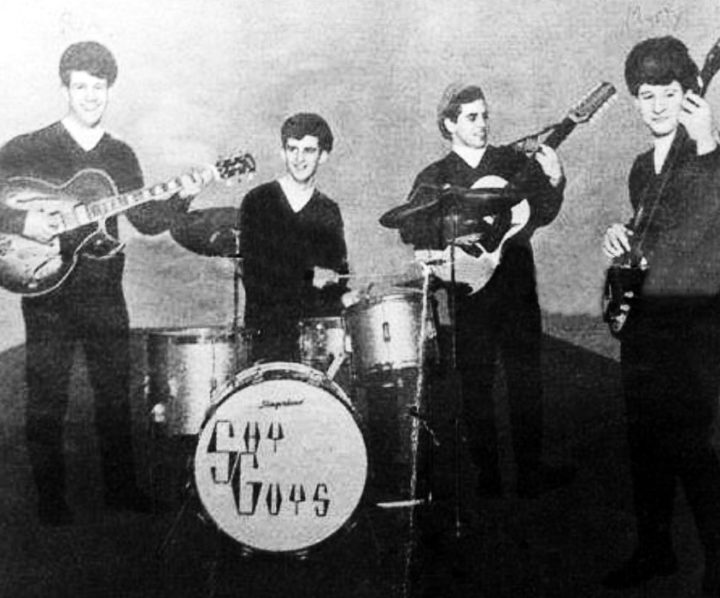The JuJus started as a trio doing a parody of the Beatles at Godwin high school in Grand Rapids in 1963. Members were Rod Shepard on guitar, Max “Junior” Colley on sax; and Bill Gorski drums, their name came from Max’s little brother’s pronunciation of “Junior”. 
In 1964 the band added Ray Hummel III on vocals and guitar and Rod moved to the bass. Hummel had a distinctive voice, and his talent for folk-influenced songwriting changed the band’s sound. Later on Rick Stevens of the Paeans (who had an unreleased 45 recorded at Fenton) came in to play guitar.
The band played live shows at the Ponytail in Grand Rapids and nearby towns like Holland and Saugatuck. In 1965 worked out a deal with Dave Kalmbach of Great Lakes Recording to do their live act between films at the Hour Theater in exchange for recording time when the theater was closed.
Great Lakes was a vanity label: the bands had to cover all recording and pressing costs and do their own promotion. Studios were originally in Dave Kalmbach’s basement, then moved to the Hour Theater, and later to the nearby town of Sparta. Bands would chose whatever label name they wanted for their 45, Fenton being the most common choice. The records were pressed at the American Record Co. in Owosso, MI, later destroyed by fire in October, 1972. Rod Shepard says, “those records sold for about ninety-eight cents of which we ended up with about a dime.”
The Ju Jus first 45 had two Hummel originals, the amazingly powerful “You Treat Me Bad” and the fifties-sounding “Hey Little Girl”. The record did well locally, supposedly reaching #2 on a chart in western Michigan in October, 1965. The future looked good and Drummond Records of Detroit offered Ray Hummel a contract based on his songwriting. The band couldn’t sign because a newly-married Ray refused to tour out of state, and Ray soon left the band. He recorded a few solo pop 45s over the years, including “Gentle Rain” / “Fine Day” on Fenton with Max Colley playing sax and Bill Gorski on drums.
The JuJu’s had several personnel changes before making their next record. Brett Wells came in on vocals, and Bruce Essex, who had played guitar with Rick Stevens in the Paeans joined for part of 1966. Then Max Colley left and Bill Gorski was drafted, so the band found guitarist Ron Burke and drummer Ron Homrich. Before long Brett left and Ron Burke took over on vocals. Rick Stevens now became the primary songwriter for the band.
Though missing Ray’s unique vocals, their second 45, from 1966, is just as good as their first. “I’m Really Sorry” has been one of my favorite garage songs since I first heard it, and “Do You Understand Me” is a strong Stones-influenced punker with sharp guitar, buzzing sounds and broken glass. The United label is another band-financed record recorded through Fenton.
In the summer of ’67 their manager Jim Geeting opened The Island, a teen club in Ludington, in which the Ju Ju’s played regularly and supported touring national acts like the Kingsmen and the Electric Prunes. By this time the band had a tougher rock sound.
In late 1967 the band broke up as Rod Shepard and Rick Stevens went into the military. Rick Stevens joined the Air Force and later died in a plane crash in New Mexico. A number of unreleased songs recorded over the years at the Hope, Chess, and Phil Robert studios have yet to see commercial release. Until recently they were distributed on tape and CDR, but they are currently unavailable, and I haven’t heard them yet.
Sources: 60sgaragebands.com interview with Rod Shepard, Ray Hummel interview by Dave Walters in R.P.M. #4 now reproduced on GrandRapidsRocks.com


 The Only Ones have one good harmony pop 45 on the Panik label, “You’re the Reason” and “Find a Way”. Larry Calder wrote both songs, registered with the Library of Congress in September, 1966 along with another original “The Only One” that seems to have been unreleased.
The Only Ones have one good harmony pop 45 on the Panik label, “You’re the Reason” and “Find a Way”. Larry Calder wrote both songs, registered with the Library of Congress in September, 1966 along with another original “The Only One” that seems to have been unreleased.





 I knew little about the Trademarks until drummer Jerry Warren’s son Zack commented below.
I knew little about the Trademarks until drummer Jerry Warren’s son Zack commented below.



 The Shy Guys from Oak Park, Michigan and their closest brush with fame was opening for a tour of the Dave Clark Five.
The Shy Guys from Oak Park, Michigan and their closest brush with fame was opening for a tour of the Dave Clark Five.